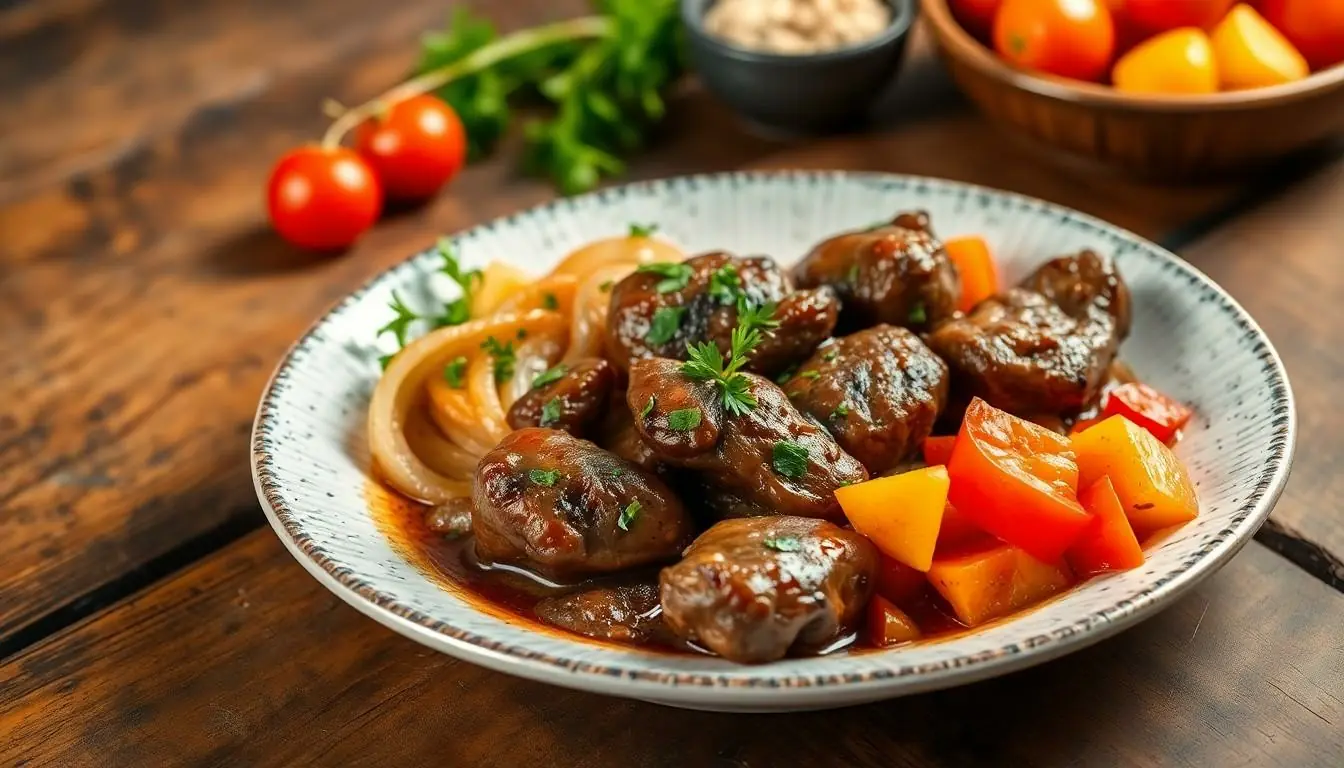Chicken livers might not be the star of the dinner table, but these little nuggets of nutrition pack a punch that even the most seasoned health enthusiast can’t ignore. If you’re tired of the same old chicken breast routine, it’s time to give chicken livers a chance to strut their stuff. They’re not just for fancy pâtés anymore; they’re a nutrient powerhouse that can elevate your meals and your health.
Loaded with vitamins and minerals, chicken livers are like the underdog of the culinary world, ready to impress with their rich flavor and impressive health benefits. From boosting energy levels to supporting immune function, these tiny organs have a lot to offer. So, why not embrace the offbeat charm of chicken livers and discover how they can transform your diet into something deliciously nutritious?
Table of Contents
ToggleOverview Of Chicken Livers Nutrition
Chicken livers offer a remarkable array of nutrients, contributing significantly to a balanced diet. Their dense nutritional profile supports overall health and well-being.
Nutritional Profile
Chicken livers are packed with essential nutrients, including vitamins A, B12, and folate. Each 100 grams of chicken liver contains approximately 165 calories, 25 grams of protein, and 5 grams of fat. Iron content stands at around 9 milligrams, making these organs an excellent source of this mineral. High amounts of vitamin A promote eye health and immune function. B vitamins such as riboflavin and niacin support energy metabolism. Folate aids in red blood cell formation, emphasizing the liver’s role as a powerhouse of nutrients.
Health Benefits
Incorporating chicken livers into a diet delivers several health benefits. Rich iron levels help prevent anemia, particularly in populations at risk, such as pregnant women. The high vitamin A content enhances vision and skin health significantly. B vitamins work to reduce fatigue and improve mental clarity, which can enhance daily functioning. Additionally, consuming chicken livers may bolster the immune system and promote wound healing. Regular inclusion of these nutrient-dense organs leads to better overall wellness and nutritional balance.
Vitamins And Minerals In Chicken Livers

Chicken livers are rich in essential vitamins and minerals, making them a nutritious addition to any diet. They provide significant amounts of B vitamins and iron, both vital for overall health.
B Vitamins
B vitamins in chicken livers include B12, B6, and folate. Each 100 grams of chicken livers contains approximately 12 micrograms of vitamin B12, which supports nerve function and the formation of red blood cells. B6 aids in protein metabolism and immune function, contributing to energy levels. Folate, essential for DNA synthesis, plays a crucial role in cell division, particularly during pregnancy. Integrating chicken livers into meals delivers these important vitamins in a delicious format.
Iron Content
Iron content in chicken livers is notably high, with around 9 milligrams per 100 grams. This amount fulfills nearly 50% of the daily iron requirement for an average adult. Iron is essential for oxygen transport in the blood, helping prevent fatigue and weakness. Including chicken livers in the diet enhances iron intake, especially for those at risk of iron deficiency. Many people benefit from this nutrient-dense food, particularly individuals following vegetarian or low-iron diets.
Chicken Livers And Dietary Considerations
Chicken livers are nutrient-rich, but thoughtful consumption enhances their benefits. Understanding serving sizes and potential health risks ensures a balanced diet.
Serving Size Recommendations
For adults, a serving size of chicken livers typically ranges from 100 to 150 grams. This quantity provides substantial nutrients without overdoing calorie intake. Nutrition guidelines suggest incorporating chicken livers into meals 1 to 2 times per week. Regular consumption at appropriate portions supports overall health without leading to excessive nutrient intake.
Health Risks And Considerations
Despite their benefits, chicken livers contain high levels of vitamin A, which can lead to toxicity in excessive amounts. Those with pre-existing conditions, such as hypervitaminosis A, should exercise caution. Additionally, individuals with liver issues or specific dietary restrictions may want to limit their intake. Proper cooking methods reduce the risk of bacterial contamination. Knowledge about these factors promotes informed decisions when adding chicken livers to a diet.
Culinary Uses Of Chicken Livers
Chicken livers offer versatile culinary applications, making them a favored ingredient in various global cuisines. Their unique flavor complements a multitude of dishes.
Popular Recipes
Various popular recipes feature chicken livers prominently. Pâté, a classic French delicacy, blends chicken livers with butter, herbs, and spices, creating a smooth spread perfect for appetizers. Sautéed chicken livers with onions, often seasoned with balsamic vinegar and garlic, serve as a delicious entrée. Italian cuisine showcases chicken livers in pasta dishes, usually combined with tomatoes and herbs for added depth. Other options include spicy chicken liver curries popular in South Asian cooking or stir-fried liver dishes that highlight Asian spices. The versatility of chicken livers makes them suitable for appetizers, main courses, and side dishes.
Cooking Methods
Different cooking methods enhance the flavors of chicken livers effectively. Sautéing is a quick method that retains moisture and brings out the natural richness. Braising involves slow-cooking the livers in flavorful liquids, allowing deeper flavor development. Grilling adds a distinctive char, making grilled chicken livers a tasty choice for outdoor meals. Baking offers a hands-off approach, often used in casseroles or mixed dishes. These cooking techniques provide numerous ways to enjoy chicken livers while ensuring they remain juicy and flavorful in various recipes.
Chicken livers offer a wealth of nutritional benefits that can elevate any meal. Their impressive vitamin and mineral content makes them a valuable addition to a balanced diet. By incorporating chicken livers into weekly menus, individuals can support their overall health while enjoying a variety of delicious dishes.
With their versatility in the kitchen, chicken livers can be transformed into gourmet delights or simple comfort food. Embracing this nutrient-dense ingredient not only enhances culinary experiences but also promotes better health outcomes. As more people discover the advantages of chicken livers, they’ll likely find a new favorite in their culinary repertoire.





